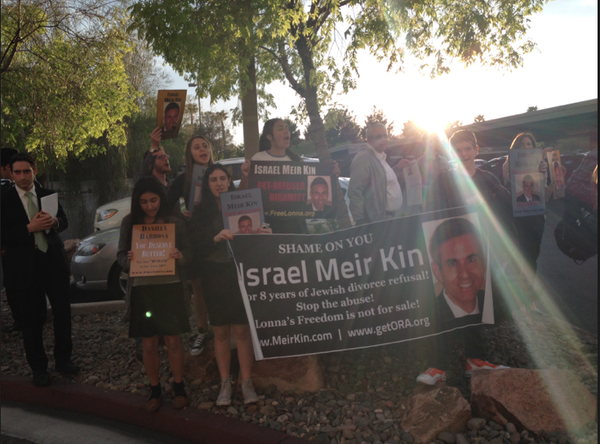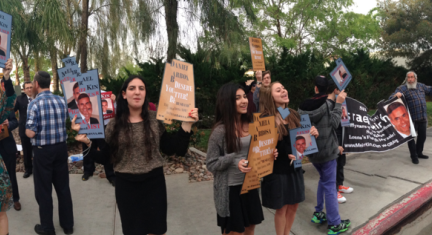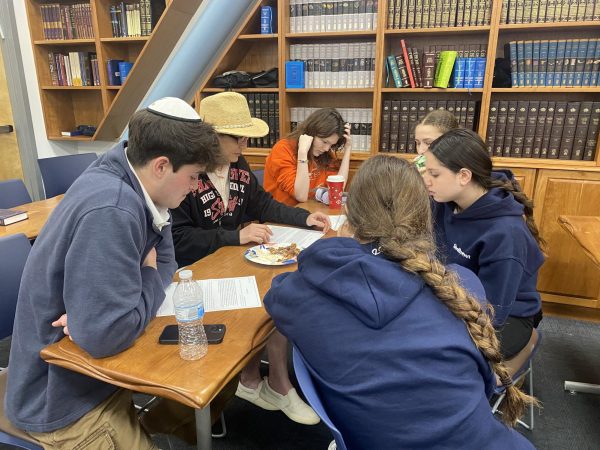Rabbis, others demonstrate against ‘get refuser’ while he is sitting shiva

PROTEST: From left, Shalhevet faculty Rabbi Yitzchak Etshalom, Dr. Jonathan Ravanshenas, Mr. Chris St. Germaine, and Rabbi David Block stood outside a home on Poinsettia Place in Hancock Park to support Lonna Ralbag’s right to a get, or religious Jewish divorce, Aug. 23. Agunah activist Rabbi Jeremy Stern joined them, at right.
Soaked from knee to toe, 40 people stood outside a shiva home on Poinsettia Place Aug. 23 to take a stand against get refusal.
Inside, a man who has refused to give his wife a valid get, or religious divorce, was observing the seven days of mourning for his mother, who died earlier this month. Shiva is a solemn time when a community normally gathers to offer comfort to the bereaved.
Shiva was being observed at the home the couple used to share, which is now owned by the husband’s relatives.The husband, Israel Meir Kin, and his wife, who now uses her maiden name of Lonna Ralbag, have been civilly divorced since 2005.
There was no visible attempt from anyone inside to stop the protest, but at 8:16 a.m., sprinklers on the lawn turned on. Local rabbis, anti-get-refusal activists, Shalhevet students and both Jewish and non-Jewish school staff were there.
The protestors’ feet and lower legs were slowly soaked, but they did not move from their positions on the sidewalk directly in front of the house.
“Meir Kin, stop the abuse!” the group chanted. “Kin family, shame on you!”
Shalhevet was made aware of the protest by Head of School Rabbi Ari Segal, who announced it on Schoology on Aug. 21 at 10:17 p.m. and in an email that day, and encouraged people to attend.
“It is vital to continue to demonstrate our communal rejection of this get-refuser, especially as he engages in the blatant hypocrisy of sitting shiva while keeping his wife in chains,” wrote Rabbi Segal.
Science teacher Mr. Chris St. Germaine, who heard about the protest from Rabbi Segal’s email. said he drives by the area of the protest on his way to work, and was convinced to attend by the severity of the case.
“I originally wasn’t going to go because it kind of felt like protesting a funeral, which gave me a bad taste in my mouth,” said Mr. St. Germaine, who is not Jewish. “But then I later heard more of the details regarding the whole situation and it became seemingly a pretty significant abuse of a spouse.
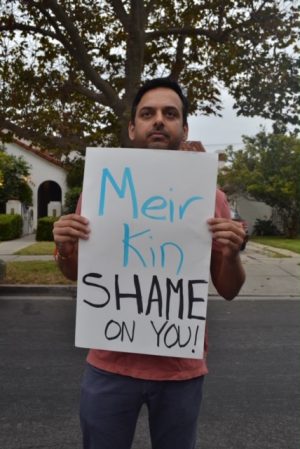
PARTICIPATE: Student Life and Admission Coordinator, Tushar Dwivedi participated in the protest as he held and vocalized a sign shaming the get-refuser, Meir Kin.
“I thought if I could…bring a little more awareness to that a woman is being, years and years after separating from her husband, still being abused by him, it seemed worthy of a half-an-hour of my time.”
The unusual timing of the protest — during shiva — reflected the frustration of many in the Orthodox world who have been trying to counter the effects of a Biblical law, which states that a man must give a get — a document of religious divorce — for the end of a marriage to be finalized. A woman can request but not give the get.
Women who do not have a valid get, or who refuse to accept a get they consider coercive — for example, one conditioned on their paying large sums of money or giving up contact with their children — become what are known as agunot, or “chained women,” because they are not religiously divorced and so cannot remarry.
Their husbands, however, can remarry, if they get approval from 100 rabbis. Mr. Kin received this approval from rabbis in a Haredi community in New Jersey and was remarried in 2014. The wedding was also met with protests.
With rabbinical courts unable to resolve the issue and civil courts unable to get involved, activists have resorted to various forms of publicity to pressure husbands into releasing their wives from ended marriages.
Rabbi Kalman Topp of Beth Jacob Congregation in Beverly Hills said the protest during shiva was allowed in this case because Mr. Kin had failed to give Ms. Ralbag a get before he buried his mother.
“The Ramah, Rav Moshe Isserlis, father of Ashkenazic authority, says that if a man refuses to give a get to his wife, that we don’t allow him to bury a relative,” Rabbi Topp told the protestors in a break from their chants.
“And I think that’s based on the gemara that says we don’t give respect even to a rabbi or to anyone when there’s desecration of God’s name, which is what’s ongoing over here.’”
The protest began at 7:30 a.m. Demonstrators carried hand-painted signs with messages including “15 years is long ENOUGH” and “Your mother will be in Gehinnom, until you free Lana from hers!” — Gehinnom referring to a Biblical concept generally understood as a resting place for wicked souls.
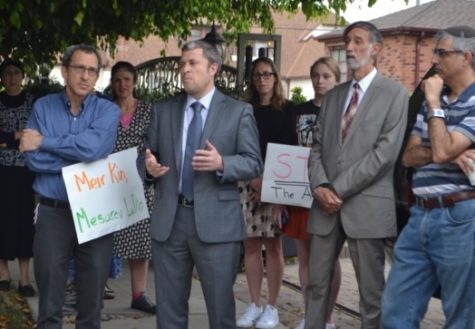
RATIONALE: From left, Rabbi Kanefsky, Rabbi Topp and Rabbi Lieberman were among the protestors. Rabbi Topp quoted Rabbi Moshe Isserlis as saying a man who refuses his a wife a get is not allowed to bury a relative.
In addition to Mr. St. Germaine, attendees included Rabbi Segal, Associate Head of School Rabbi David Block, Principal Mr. Daniel Weslow, Rabbi Abraham Lieberman, Rabbi Yitzhak Etshalomand Student Life and Admissions Coordinator Mr. Tushar Dwivedi, along with Rabbi Topp and Rabbi Yosef Kanefsky, senior rabbi of B’nai David-Judea Congregation in Pico-Robertson.
The only Shalhevet students at the protest were Boiling Point staff.
Guests who went in and out of the house to pay shiva calls were met with shouts and chants of “shame on you.” As one woman drove into the driveway, a man shouted at her, “Could be you in a few years!”
At 8:06 a.m., five police officers spoke with the protestors, who had been spread out on the driveway and grass beside the sidewalk, and told them to stand only on the sidewalk itself.
Neighbors on Poinsettia Place in the Hancock Park area stood outside their homes and watched the protest. Some interacted with the demonstrators.
One neighbor who asked only to be identified as Debbie said that Israel Kin’s actions should not affect the mourning of his father, who she referred to as Rabbi Kin, for his wife. The Boiling Point was not able to confirm his first name.
“This is disgusting,” said Debbie. “Because one thing has nothing to do with the other. Rabbi Kin is an amazing man. He just lost his wife… This is not about religion. Leave the man alone, let him mourn, and deal with this after.”
Israel Meir Kin and Lonna Ralbag divorced under California law in 2005, but Mr. Kin has refused to give her a valid get, a religious document recognizing the divorce, rendering Ms. Ralbag an agunah.
In a Youtube video he posted on Aug. 21, Mr. Kin said, “You should know that a get has been waiting for my wife for over 10 years at the Beit Din of Shaarey Mishpat [in Monsey].”
The Boiling Point has not seen this get, but In 2014, the New York Times reported Ms. Ralbag stating, this get would be conditional on her giving Mr. Kin a payment of $500,000 and custody of their son, who was 12 years old at the time the get was written.
According to Rabbi Block, a conditional get could still be considered valid, regardless of whether or not it contained an unfair condition.
“Putting the moral pieces of that aside, if it was a conditional get, and those conditions were met, and the get was halachically constructed and the Beis Din, that was a reputable Beis Din, signed off on it, then it would be an effective get,” said Rabbi Block.
But in this case, it was not, because the rabbinic court, or beis din, that issued it is not considered authoritative.
“I don’t know the dayanim, or judges, personally,” said Rabbi Block. “I know that any three people can technically come together and claim to be a beis din. And the way that we make determinations about the authority of a beis din is by looking at the Torah scholars and the experts in halacha [Jewish law] that we are comfortable with. And the dayanim on the Beis Din of America, of the RCA, Rav Herschel Schechter and others haven’t recognized this as a reputable Beis Din. At least insofar as they’ve been dealing with this case.”
After Mr. Kin’s mother died earlier this month — the Boiling Point was not able to determine the exact date — the Kin family wished to have her buried in Israel, where all burials are controlled by rabbinic authorities.
Media reports stated that the Ashkenazi Chief of Israel, Rabbi David Lau, ordered that she could not be buried until Mr. Kin gave Ms. Ralbag a new get. They said the Rabbinate continued with the burial after Mr. Kin agreed to do so.
Mr. Kin said in the video posted Aug. 21 that those reports were false.
“You should all know that this is fake news,” Mr. Kin says in the video. “No one from the rabbanut — not Rabbi Lau, nor any of his subordinates — ever contacted me at any point. Nobody else representing my name ever agreed to any conditions, such as paying money to be left as collateral until a get is delivered.”
He went on to accuse the Israeli rabbinate of corruption.
Reached for comment several times, Ms. Lonna Ralbag promised she would contact the Boiling Point at a later time but so far has not done so.
Esther Macner of Get Jewish Divorce said that Ms. Ralbag works full time to support herself and her family and is not available during the day, and that she is usually not as busy as she is now.
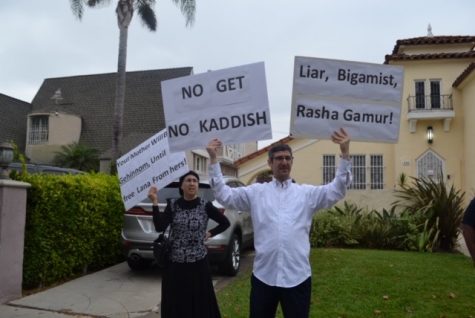
ANGER: Demonstrators were trying to get Israel Meir Kin to grant a proper religious divorce to his former wife. Inside the house, Mr. Kin was sitting shiva for his mother.
Also in attendance at the protest was Rabbi Jeremy Stern of Efrat, Israel. Rabbi Stern is the former executive of the Organization for the Resolution of Agunot, had worked on the Kin case and happened to be in Los Angeles on vacation.
Rabbi Stern said that demonstrations have to take the place of any punishment that would be given under Jewish law.
“Essentially it’s like we have speed limits without traffic cops,” said Rabbi Stern. “[Mr. Kin] is breaking the law but we have no way of enforcing the law. If we were able to, we’d put him in jail… The problem is that we have a separation of church and state in the United States and so we can’t enforce Jewish law.
“But what we do have is communal pressure… that’s why these types of rallies and these demonstrations are so important. And it’s not only for this case specifically but to make a statement throughout the community that get refusal is unacceptable. That no one should think that there are no consequences for get refusal. Rather, each and every case where a man refuses to give his wife a get, we will be there to demonstrate against him.”
Rabbi Stern said get refusal was against Jewish law and also a kind of domestic abuse.
“Domestic abuse is not just about black-and-blue marks,” said Rabbi Stern. “It’s about a pattern of controlling behavior, about a repeated assertion of power and control from one party over the other, and that’s exactly what’s going on in each and every case of get refusal.”
One protestor who would be identified only as Ron said that greater communal effort was required to force Mr. Kin to give a get.
“It’s just despicable that somebody can go for 15 years without giving a get,” said Ron. “He’s moved on, he’s married and he lied to the rabbanut… How anybody here in the community can support the family, it’s against halacha.”
He said there was more that communities could do, and suggested cherem, a form of being ostracized or excommunicated.
“Someone who refuses to give a get … should be ostracized from the community,” said Ron. “But the whole community here doesn’t do it. If the whole community stood up against the family, then the family would have to pressure him to do it.”
Esther Macner, founder and president of Get Jewish Divorce Justice, said this case made the need for rabbinic annulments to become more prevalent.
“This case specifically demonstrates, I believe, how the system is broken down,” said Ms. Macner. “It demonstrates that when someone is so evil and determined not to give a get, we need to find solutions that are there in halacha to invalidate these marriages. We need to really have rabbinic courts make the effort to find a solution in halacha that would free these women without a get. The solutions are there, they are not being used.”
Ms. Macner expanded on the concept of bittel kadushin, voiding a marriage.
“When you have a case where a man does not want to give a get, the Beis Din can, if they summon him and he doesn’t show up, can go ahead and hear testimony from the agunah herself and any documentary evidence she has or witnesses of the husband’s defects,” said Ms. Macner.
“So for instance if there is abuse, whether sexual, physical, financial, all of these things are factors that a Beit Din should investigate, and find whatever proof they can in the form of medical records or police reports or even testimony of neighbors or other family members who observe them together,” she said. “And once they investigate and come to a determination that there was domestic violence or mental dysfunction, the marriage can be voided.”
In 2014, Shalhevet students and faculty protested outside Mr. Kin’s wedding to his second wife in Las Vegas.
Having multiple wives is legal in the Torah but was made illegal under Jewish rabbinic law. It can be permitted if a man is given a heter meah rabbanim, an overriding of a rabbinic law by obtaining the signatures of 100 rabbis; this heter makes it possible to marry a new wife while still being halachically married to the previous.
The heter meah rabbanim cannot be applied to women since a woman having two husbands is considered committing adultery, which is prohibited in the Torah itself.
Therefore, at the present time, Mr. Kin has two wives, while Lonna Ralbag is an agunah.
Torah Editor Liad Machmali contributed to this story.
This story won Fourth Place, NSPA 2020 Social Justice Reporting of the Year.

Jacob Joseph Lefkowitz Brooks was editor-in-chief during the 2019-20 school year and is now a student at the University of Toronto.

